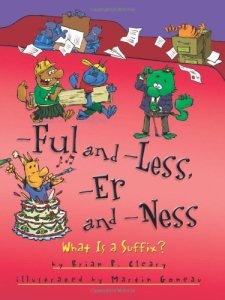 .
.
—full and —less, —er and —ness: What is a Suffix? (Words Are Categorical)
by Brian P. Cleary & Martin Goneau, illustrator
Millbrook Press
978-1-4677-0610-0
Age 32 pages
“A good paper, poem, or book isn’t written, it’s rewritten.” ~ Brian P. Cleary
“What is a Suffix? You’ll find the answer inside this book—it’s overflowing with wonderful suffixes. Brian P. Cleary’s playful rhymes and Martin Goneau’s humorous illustrations creatively present the concept of suffixes for young readers. For easy identification, key suffixes appear in color, and the comical cats reinforce each idea. —full and —less, —er and —ness: What is a Suffix turns traditional grammar lessons on end! Read and reread this book aloud and delight in the sense—and nonsense—of words.”
Opening
“Suffixes are word parts that are tacked on to a word. You’ll find a suffix at the end of farmer and preferred.”
Review
—full and —less, —er and —ness: What is a Suffix is one book of many in Cleary’s series Words are CATegorical. Kids will learn and have fun reading this funny book with the funniest illustrations. They will understand suffixes, and the probability of remembering what they learned increases with each rhyming sentence.
What is suffix? A suffix changes the meaning of the root word. In this edition of Words are CATegorical, Cleary used the four title suffixes and engaging rhyming sentences that kids will understand almost immediately.
“The E-R part of farmer speaks of someone who is doing, like the baker who is baking or the viewer who is viewing.”
Adding crazy illustrations of cats dressed as chefs and decorating cakes—one a disaster—while a third cat waits to eat the finished confection, helps kids remember what the suffix —er adds to a word with their sense of sight. The more senses that are involved, the easier it is to remember the information.
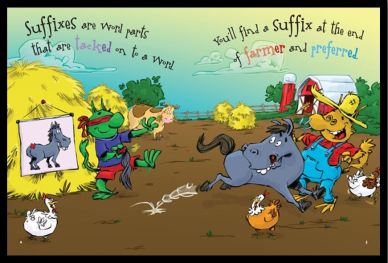
I doubt anyone could have done a better job with suffixes than Cleary and Goneau. Brian Cleary’s writing is a gift. He understands the best way to teach kids and have them truly understand and remember the concept. That would explain the success of not only this series, but nearly everything Cleary has written. Goneau’s illustrations comically present the concept so kids can actually see the suffix at work.
Homeschooling moms and dads need the Words are CATegorical series. The English language, being a difficult language to learn, comes alive in What is a Suffix? One read through and you will understand the mastery Cleary has over the English language and his ability to explain its concepts so kids can understand and remember by book’s end. It makes sense that school libraries should invest in this series. Kids having trouble grasping a language arts concept in class can read the applicable book, from the 25 thus far in the series, adding one more approach to teaching the English language. Sometimes with a new approach, kids get it and Cleary’s approach is most assuredly an “I get it” approach.
.
—FULL AND —LESS, —ER AND —NESS: WHAT IS A SUFFIX? Text copyright © 2014 by Brian P. Cleary. Illustrations copyright © 2014 by Martin Goneau. Reproduced by permission of the publisher, Millbrook Press, Minneapolis, MN.
.
Learn more about the series Words are CATegorical HERE.
Get your copy of What is a Suffix, or any of the 25 books in the series at Amazon —B&N—Millbrook Press—your local bookstore.
—B&N—Millbrook Press—your local bookstore.
.
Meet the author Brian P. Cleary at his website: http://www.brianpcleary.com/
Meet he illustrator, Martin Goneau, at his website: http://www.goneau.com/
Follow at the Millbrook Press facebook: https://www.facebook.com/millbrookpress
Millbrook Press is a division of Lerner Publishing Group
.
Also by Brian P. Cleary
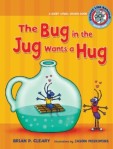
The Bug in the Jug Wants a Hug
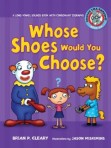
Whose Shoes Would You Choose?
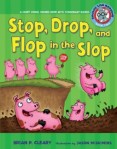
Stop, Drop, and Flop in the Slop
.
.
.
.
.
Also by Brian P. Cleary & Martin Goneau
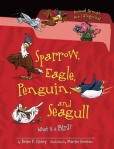
Sparrow, Eagle, Penguin, and Seagull: What Is a Bird?
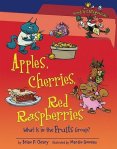
Apples, Cherries, Red Raspberries: What Is in the Fruits Group
.
.

Filed under:
5stars,
Children's Books,
Library Donated Books,
NonFiction,
Picture Book,
Poetry,
Series Tagged:
Brian P. Cleary,
children's book reviews,
languge arts,
Lerner Publishing Group,
Martin Goneau,
Millbrook Press,
suffix,
Words are CATegorical 







By Alexander Humez
Phone (from Greek φωνή ’sound [of the voice], voice, sound, tone’) shows up in English as a prefix (in, e.g., phonograph), a root form (in, e.g., phonetics), a free-standing word (phone), and as a suffix (in, e.g., gramophone) of which A. F. Brown lists well over a hundred in his monumental Normal and Reverse English Word List, though considering that -phone in the sense of “-speaker of” can be tacked onto the end of any combining root that designates a language (as in Francophone), the list of possibilities is considerably greater.
Urdang, Humez, and Zettler in their Suffixes and Other Word-Final Elements of English distinguish among four senses in which the suffix -phone is used (six for -phonic), an overloading that has occasionally resulted in polysemy, where a word has come to have multiple meanings, whether through semantic evolution (e.g., telephone, which has come some distance from its original meaning, now no longer in use), independent invention (e.g., hypophone, which was coined by two different people to mean two very different things), or different etymological histories (e.g., diaphone, in which the -phone of one has a different immediate derivation from that of the other). Follow THIS LINK for a short list of polysemic words ending in -phone, each of which is accompanied by three examples or definitions, two of which are correct and the other of which is bogus. See if you can identify the phonies.
Alexander Humez is the co-author of Short Cuts: A Guide to Oaths, Ring Tones, Ransom Notes, Famous Last Words, and Other Forms of Minimalist Communication with his brother, Nicholas Humez, and Rob Flynn. The Humez brothers also collaborated on Latin for People, Alpha to Omega, A B C Et Cetera, Zero to Lazy Eight (with Joseph Maguire), and On the Dot. To see Humez’s previous posts, click here.

Serious Word “age”
I love words. They are fun, they come in all kinds of languages, you can rhyme them, say them for nothing, say them quietly or loudly or even not at all and, best of all, they are easy to exploit. One word can have several meanings, and if you add extra letters to them, they can mean even more.
One of my very favourite things, as a matter of fact, is to play the “age” game, I add those three letters to random words to see if it works. Sometimes the “g” is soft, as in “massage”, and sometimes it is a hard “g” like the word “message”. The words may end up as nouns or as verbs and once in a while you can turn a noun into a verb or vice versa. Usually the hard “g” turns it into a noun type of word and the soft makes it a bit more verb “ish”.
Bless is a good one, “blessage” (hard “g”) is a word I use when someone sneezes, it means “bless you” in Binkdonk’s dictionary.
Burp is interesting because it uses both types of “g”. “Burpage” (soft “g”), is what you do with gassy infant. Burpage (hard “g”) is usually what happens after guzzling a carbonated beverage much too fast.
Fail; not what anybody wants to do, however, “failage” (hard “g”) happens when tests are not studied for or when there is a lack of focus and intent in whatever is attempted (nothing that some serious planning cannot overcome).
Spank is my favourite! “Spankage”, (soft “g”) is reminiscent of a spanking that relaxes you, it even sounds like it when said in a soft voice. On the other hand, “spankage” (hard “g”) is what you get when you don’t obey.
Whip, as unlikely as it seems, makes sense. “Whippage”, is what you get when going through dense forest undergrowth at any kind of rapid pace. Especially if the person ahead of you is just letting the branches fling back at you. Try to go first, in order to prevent this calamity from happening to you .
Oh! The possibilities are endless. There is also the option of changing the meanings of words that already have the “age” suffix. Just by making it hard or soft.
Do be careful with the soft “g’s” in case it sounds too pretentious but have fun and really enjoy that sound as it slides out of your mouth.
Serious Word “age”
I love words. They are fun, they come in all kinds of languages, you can rhyme them, say them for nothing, say them quietly or loudly or even not at all and, best of all, they are easy to exploit. One word can have several meanings, and if you add extra letters to them, they can mean even more.
One of my very favourite things, as a matter of fact, is to play the “age” game, I add those three letters to random words to see if it works. Sometimes the “g” is soft, as in “massage”, and sometimes it is a hard “g” like the word “message”. The words may end up as nouns or as verbs and once in a while you can turn a noun into a verb or vice versa. Usually the hard “g” turns it into a noun type of word and the soft makes it a bit more verb “ish”.
Bless is a good one, “blessage” (hard “g”) is a word I use when someone sneezes, it means “bless you” in Binkdonk’s dictionary.
Burp is interesting because it uses both types of “g”. “Burpage” (soft “g”), is what you do with gassy infant. Burpage (hard “g”) is usually what happens after guzzling a carbonated beverage much too fast.
Fail; not what anybody wants to do, however, “failage” (hard “g”) happens when tests are not studied for or when there is a lack of focus and intent in whatever is attempted (nothing that some serious planning cannot overcome).
Spank is my favourite! “Spankage”, (soft “g”) is reminiscent of a spanking that relaxes you, it even sounds like it when said in a soft voice. On the other hand, “spankage” (hard “g”) is what you get when you don’t obey.
Whip, as unlikely as it seems, makes sense. “Whippage”, is what you get when going through dense forest undergrowth at any kind of rapid pace. Especially if the person ahead of you is just letting the branches fling back at you. Try to go first, in order to prevent this calamity from happening to you .
Oh! The possibilities are endless. There is also the option of changing the meanings of words that already have the “age” suffix. Just by making it hard or soft.
Do be careful with the soft “g’s” in case it sounds too pretentious but have fun and really enjoy that sound as it slides out of your mouth.

Cassie Ammerman, Publicity
Mark Peters, the genius behind the blog Wordlustitude in addition to being a Contributing Editor for Verbatim: The Language Quarterly, and a language columnist for Good, and the author of Yada, Yada, Doh!: 111 TV Words That Made the Leap from the Screen to Society, is our guest blogger this week. Check out his past OUPblog posts here. In this post, Mark looks at how the -y suffix seems to have gone completely bananas.
Many lessons can be gleaned from watching reruns of Buffy the Vampire Slayer: Indirect sunlight is not an unlife-ender for vampires. Some small-town mayors may yearn to become giant unholy snake things (no surprise there). As Cordelia Chase said, “People, you’ve got to leave your tombs earthed.” (Whoops, that was on the Buffy spinoff Angel—but whatever).
Amidst these practical tips for living, a lexical lesson emerged on the Joss Whedon show: the –y suffix is on a rampage, and it can attach to almost anything, as shown by on-show coinages such as crayon-breaky, heart-of-darkness-y, out-of-the-loopy, stammery, twelve-steppy, and unminiony, which were discussed by Michael Adams in Slayer Slang: A Buffy the Vampire Slayer Lexicon. Adams follows up on the adventures of the –y suffix in his new book Slang: The People’s Poetry, which records other wild examples from the web and elsewhere, including beliefy, four-lettery, Jesusy, super-protecty, and co-y—a blend of prefix and suffix without a traditional root, meaning codependent-y.
As friends and countrymen know, I am a modest soul who wouldn’t dare compete with the remarkable Adams in the octagon or elsewhere, but I’ll stack my pile of wacky –y suffixed words up against his any day. While collecting nonce words for my dictionary-blog Wordlustitude, I’ve scooped up plenty of Buffy-esque adjectives, such as come-hither-y, creepy-uncle-y, forbidden-love-y, gone-to-the-darksidey, homicidal maniac-y, pins-and-needles-y, post-traumatic stress syndromey, princess of darkness-y, self-hatey, and special-forces-y. Nuff said on the –y suffix, right?
Nuh-uh. Holy guacamole, there is a lot more to the story.
I’ve noticed a sub-species of unlikely –y suffixed words that is even more of a wonder, words that might be the biological equivalent of discovering a wombat that is half meerkat and maybe one-eighth Don Rickles: words like military-y, Monday-y, prophecy-y, and yay-y have a double-y construction that shows the –y suffix is even more versatile than Adams imagined and the Buffy writers demonstrated.
Before getting to the good stuff, it should be noted that odd-looking –y suffixed words are not entirely new-ish and Buffy-influenced. The OED records some infrequently used older terms with a contemporary zing: weekendy (1930), newspapery (1864), skeletony (1852), gossamery (1790), and heatheny (1580) are just a few examples. One oldie in particular is the lost cousin of the words I’ve been collecting: clayey, which popped up as far back as 1024 and is still turning up more recently: “PS: Don’t text during ceramics class, gets your phone all clay-y.” (March 17, 2009, Off-Screen I Ramble).
In an email interview, Adams said “As you know, when it comes to word formation, almost anything is possible, but when a word ends with a vowel, it’s unlikely to take -y.” That said, Adams’ own work has turned up vowel-vowel combos such as wicca-y and zebraey, while I’ve spotted the recently useful swine-flu-y. Some of the double-y words I’ve found are basically in the same category: birthday-y, doomsday-y, holiday-y, hoyay-y, killjoy-y, Monday-y, slay-y, soy-y, and yay-y repeat a letter but not a sound, so they look a little stranger than they are. That said, they are still damn strange.
Far odder and more unlikely are the double-y words where the same sound is repeated, such as biology-y, Buffy-y, comedy-y, conspiracy-y, democracy-y, gravy-y, history-y, jealousy-y, lady-y, memory-y, military-y, mythology-y, prophecy-y, secret-identity-y, spy-y, strawberry-y, synergy-y, technology-y, and theory-y. The repeated sound is also found in words like bee-y, me-y, pee-y, squee-y, and tree-y which look more normal alphabet-wise, but are just as weird soundwise. As Adams says, “That is simply the least likely pattern, and one wonders if such forms ever occur in speech; it’s a pattern easily constructed in Webtext—it’s readable, even if it’s not sayable.”
But it is sayable! Or at least it’s performable, as I discovered while watching the ultra-disturbing Christopher Reeve episode of South Park (”Krazy Kripples,” March 26, 2003), which contained this line from a reporter: “Tom, the irony is even more irony-y as it appears that the stem cells have given Christopher Reeve almost superhuman strength.” That example is also interesting for breaking the “all X-y” formula that encompasses just about all of my examples, which refer to people “being all guy-y,” getting “all Hillary-y,” “feeling all holiday-y,” and “smelling all strawberry-y.” It appears that this productive formula is stronger than the phonetic taboo of the double-y, allowing for a wide array of square, rhombus, and hippo-shaped pegs to be placed in this round hole.
But the –y suffix is also mighty, and there are other examples that show double-y words can occur outside this formula, like this Battlestar Galactica-related comment from Television Without Pity: “As for the moniker, at last night’s LA show the question came up again, and we got a pretty firm response from Verheiden that it was purely an aesthetic decision, made at the last minute—they thought ‘Zeus’ sounded ‘too mythology-y’ and preferred the rhythm of ‘Jupiter.’” Then there’s hoyay-y—a variation of the fan abbreviation meaning “Homoeroticism, yay!”: “I really like the Poconos one, but isn’t that a bit too hoyay-y for the friendship thread?” So the formula certainly helps, but it isn’t necessary to produce these whacked-out words.
Now if all that isn’t enough to give you new respect/loathing for the –y suffix as it expands/desecrates the English language, let me make your mind go kaboom once more.
After years of weird-word collecting, I’m pretty unfazed by words with multiple, redundant, exuberant suffixes. As the collector of battle-tastic-tacular-gasm-worthy and mega-legal-robo-proctologist, it’s going to take some pretty fancy suffixation to turn my head. However, even I was gobsmacked out of my chair when I spotted mystery-y-ish-y.
Yowza. That is a triply redundant suffix, plus a double-y, with sort of a triple-y. Mystery-y-ish-y is a lexical wonder, but it does have some slightly less wondrous near-relatives: I spotted analogue-y-ish-y, emo-y-ish-y, and orange-y-ish-y in the wild, so that particular combo of suffixes isn’t a total anomaly. But it is, dare I say, in my best Mr. Spock voice, quite anomaly-y.
More evidence of extreme suffixation can be found in the following list of examples, which may inspire your own uses of the –y suffix. After studying the evidence, I can strongly recommend that this suffix be used with no caution whatsoever. Like doughnuts—according to Homer Simpson and my own privately funded research—it really can do anything.
birthday-y
“yay other! Hope today’s all birthday-y and fun!”
(Nov. 6, 2007, Stationzer0)
candy-y
“decorations were amazing, i mean it’s all candy-y and fantasy like…. like from Charlie and the Chocolate Factory, they had candy trees, ginger bread house, candy house… and loads of HUGE christmas trees…”
(Dec. 25, 2006, The One in Penang)
conspiracy-y
“i’m trying not to sound all conspiracy-y here, (trilateralists? bilderbergers? shadow government established by the 1947 roswell alien visit?), but…he’s not a stupid guy. i firmly believe he’s advancing his agenda, whatever it might be….and the fact that we conservatives, his alleged base, don’t like it means nothing to him at all.”
(Jan. 8, 2007, Riehl World View)
history-y
“But, unfortunately, the Declaration isn’t official policy of any country anywhere or at any time. It was a statement of intent written by a small group of people who acted without sanction of any governing body. The US didn’t exist for more than a decade after that. I mean, since we’re being all history-y here.”
(Sept. 4, 2008, The Edge of the American West)
holiday-y
“Are you feeling all holiday-y now? All the special Chrisma-hanau-kwanza-kah feeling that’s in the air, and also on Starbucks’s annoying playlist is already starting to grate on my nerves.”
(Dec. 3, 2008, Food in Mouth)
jealousy-y
“maaan, i need to see this movie. and i’m gonna be all jealousy-y when claira gets it for Christmas. hahaa”
(Dec. 6, 2008, Livejournal)
killjoy-y
“After fueling all kinds of fun ‘What if X bought Moto?’ mashups with rumors they were fleeing the handset business like a burning building, Motorola gets all killjoy-y today, affirming that they’re ‘fully committed’ to the mobile biz. Hey, there have been bigger turnarounds.”
(Feb. 11, 2008, Matt Buchanan, Gizmodo)
lady-y
“My parents are awesome. My Dad’s all nature-y and work-y and my Mum’s all lady-y and they’re both daft and then I am a super combo of their awesome points (and then their tempers >__>;; ) and then yesssss. I win.”
(March 28, 2009, Ultimate Guitar Community)
memory-y
“And now I’m all memory-y thinking about ice-skating at the rink right around the corner from that theater when I was growing up.”
(Nov. 13, 2006, Whedonesque)
mystery-y-ish-y
“My faith tells me that marital sex, like all acts blessed with holiness, is a great mystery — and from thence comes its beauty.
Well, it WOULD be wouldn’t it? Since Dawn’s not married, she can’t be having marital sex. It’s all mystery-y-ish-y. And she can imagine it’s pretty, if she wants.”
(May 23, 2006, Pandagon)
philosophy-y
“I’m sorry to get all philosophy-y here, but I think these supposedly philosophical questions matter an awful lot to the politics at stake here.”
(May 24, 2008, Pandagon)
secret identity-y
“And don’t be all sneaky when you come in. Y’know … all secret identity-y, and then come back on here and post about how dumb I am and stuff. ‘Cause that would be just plain mean.”
(Dec. 15, 2006, Comic Books Resources Forums)
secret society-y
“I love it when they get all secret society-y”
(April 19, 2003, Livejournal)
soy-y
“i’ve just made my latest incredible discovery - boysenberry soy yoghurt, or as i like to call it, ’soyghurt’. it doesn’t upset my lactose-unfriendly stomach and doesn’t taste all soy-y and is creamy and filled with delicious boysenberries and 99% fat free! and it was on special at coles barkly square! brilliant!”
(Jan. 17, 2006, from the irish meaning ‘ditch/canal builder’)
spy-y
“It was all spy-y and computery. The poor man’s Tom Clancy, I guess.”
(May 16, 2007, The Sheila Variation)
technology-y
“They are orange! They are cute! They are all technology-y and stuff! They feel like nothing I’ve ever worn before, and they feel goooood!! I’m very psyched. They even come with a DVD to teach me how to wear them, they are so advanced!”
(Feb. 24, 2007, Asparagus and Mayonnaise)











